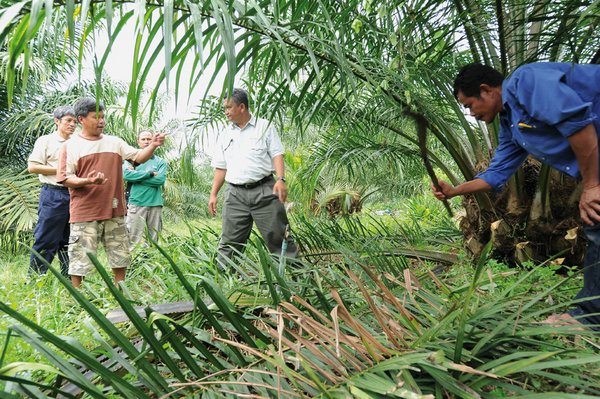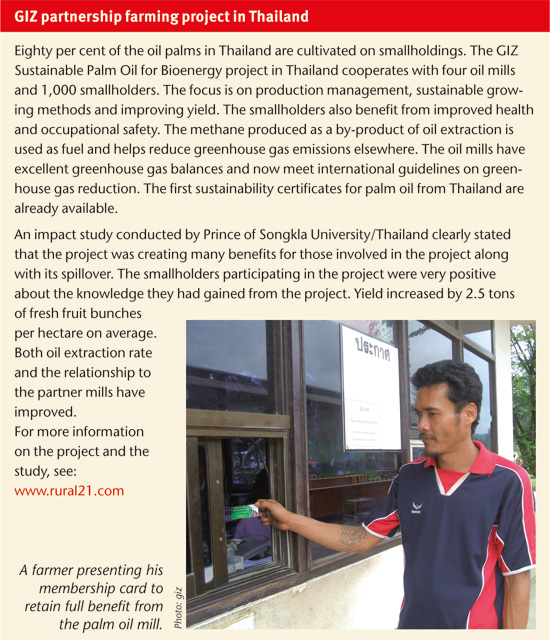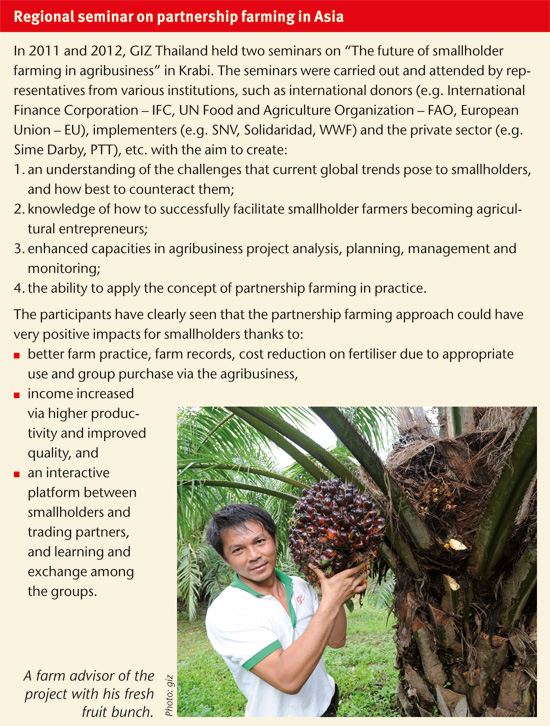 Download this article in magazine layout
Download this article in magazine layout
- Share this article
- Subscribe to our newsletter
The GIZ partnership farming approach: A future for smallholder farming?
With the emerging agricultural market opportunities (increasing prices and demand for sustainability) in developing countries, there is the unique chance, but also the need, to support smallholder agriculture and rural areas as a whole to benefit from this market development. At the same time, it is essential to modernise and optimise smallholder farming systems and to produce more from less, while doing so in an environmentally sustainable, efficient and socially just manner. Acting as a manager, the farmer plays the decisive role in this system. Commercial farming has been promoted by various actors as a key means to improve the livelihoods of smallholders around the globe. Agricultural projects attempt to build capacity by providing or enabling solutions to the target context where, in most cases, smallholders are subject to inferior conditions regarding intrinsic and extrinsic factors in optimising their farming.
Fully market-oriented and demand-driven project designs use the classic value chains approach as analytic tools, but turn the perspective for implementation around: from consumers, industry and traders to farmers. So the value chain starts on the market side and ends with the farmers and the input suppliers.
The GIZ partnership farming approach provides a holistic and long-term sustainable solution, through investment in farm system management, capacity building, production modernisation and strengthened linkages between buyers, traders and farmers.
Smallholders and agribusiness
The partnership farming approach has been developed by combining lessons learned from the long-term experience that GIZ (Deutsche Gesellschaft für Internationale Zusammenarbeit) has gained in optimising agricultural supply chains, market-oriented smallholder development programmes and private sector cooperation projects. Partnership farming is based on the awareness that the paradigm change towards a closer interaction between agribusiness and smallholders to create large impacts is about to expand from upscale niche products into commodity markets through high quality standards and shortages of agricultural raw materials. The approach seeks to synergise the strengths of smallholder farmers and national and international agricultural processing companies (agribusiness).
Doing so solves the weaknesses of both parties. The typical constraints that smallholders face in farming are small plots of land, poor farm management and input knowledge, limited, if any, access to financial means, and use of improper quality or insufficient farm inputs, i.e. seed, seedling, animal breed, feed, fertiliser, etc. Thus the farm yield of smallholders is rather low and often produces poor quality. Agribusiness is faced with the problem of low quantity and quality of smallholder production and the large transaction costs when it comes to e.g. the introduction of produce and sustainability standards.
Processing companies normally hold superior attributes compared to the smallholder and know the market demands. Cooperation between the smallholders and processing and trading companies by sharing mutual interests and benefits like higher quantities, qualities and prices can lead to a win-win situation for both parties and for the national economy as a whole. The partnership farming approach promotes a sustainable agriculture and contributes to improving farmers’ agricultural know-how, which is necessary to access high-quality domestic and international markets.
Key factors and activities for a successful partnership farming project
If a partnership farming project is to be successful, the requirements listed in the following have to be met.
- A macro-economic framework for strong agricultural-based poverty reduction and rural development.
- A combination of smallholder production in the field with large-scale activities in processing (economies of scale, which is important for commodity markets).
- The establishment of long-term interdependence and trustful business partnerships where mutual interest, benefits, and information are shared (not necessarily on a contractual basis) rather than spot-market relations.
- Technical knowledge and technology transfer from agribusiness to smallholder groups.
- Farming as a business, with farmers as agripreneurs.
- Next to commodity specific training, basic agricultural education should be provided.
- An inclusion of agricultural labour.
- Direct business relations between farmers and the processing companies (minimising the involvement of middlemen)
•An implementation strategy aimed towards sustainability of farmers, starting out from mutual benefits:Increase productivity (t/ha) to ensure total output for companies and income for farmers.
- Improve quality (grades) via quality-based price premium incentives.
- Organise joint and quality procurement for agricultural inputs for the farmers.
- Internalise sustainability practices for a sustainable livelihood and community, i.e. occupational health and safety, labour welfare, high conservation values, etc.
To assure that these characteristics are met, a number of essential activities need to be performed:
- Conduct a professional analysis for sustainable markets.
- Define the situation with a participatory appraisal and/or scientific baseline study to assess its essentials and the needs of target farmers.
- Ensure farmers’ group formation with a focus on production optimisation. Develop farmer-friendly and practical training and education materials for distribution.
- Set up a system to disseminate good practice aspects incorporating local farm advisers (FA). FAs should be from the production region and be familiar with the farming business (ideally as farmers’ sons and daughters) to secure a strong day-to-day working relation.
•Public funding should be provided as seed money for further development, but with a clear exit strategy for such funding right from the beginning. The goal of the partnership farming concept is to enable farmers to become self-sufficient decision-makers, “agripreneurs”, which allows for a more flexible production system and highlights farming as a profession by choice and not by inheritance. Partnership farming promotes the capacity of farmers to adopt modern agricultural practices and enhance the international competitiveness of smallholder agricultural production.
The difference: farmers and agricultural labourers as long-term partners
The major difference and the improvement that the partnership farming approach offers in contrast to the usual contract farming arrangement is that the buyer is willing to contribute to a broader agricultural education for farmers. The farmers are seen as strategic partners for the agribusiness, and therefore the companies should also invest in the development of their partner farmers.
The processing partners in the Partnership Farming system combine their practical production farm advisors with the co-ordination and organisation of public extension and training systems to provide the farmers with holistic agricultural knowledge which can be applied to a variety of commodities and production systems. To sustain knowledge sharing amongst the partners in the production system, an exchange platform needs to be facilitated to ensure a learning community between buyer/processor, farmer and agricultural labourer for improved agricultural production.
Partnership farming emphasises the value and importance of relationships between several levels in the production system, including farmers, labourers, processors, buyers and the environment. The collaboration between the different actors in the production system strengthens the agricultural labourers and improves their knowledge base and income situation. Often, the needs of agricultural labour are not met or not even targeted by extension services. But in many farming systems, the agricultural labourers are a key factor to implement change in production in terms of productivity, quality and natural resource management. This is why the partnership farming approach incorporates agricultural labourers in the training and education activities. Trustful and respectful working relationships between all the actors in the partnership farming system and a sustainable use of natural resources guarantee a sustainable welfare base for both present and future generations.
More information
GIZ project
Certification for smallholders
Prince of Songkla University study
Dr Thomas Breuer
Sector Project “Agricultural Trade and Private Sector Cooperation in Rural Areas”
Deutsche Gesellschaft für Internationale Zusammenarbeit (GIZ) GmbH
Eschborn, Germany
thomas.breuer@giz.de
Dr Yotsawin Kukeawkasem
Smallholder Farming and Agribusiness Expert; GIZ Consultant
Neuberg, Germany
yotsawin@gmail.com







Add a comment
Be the First to Comment